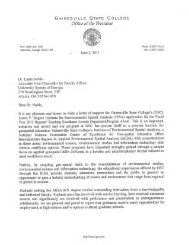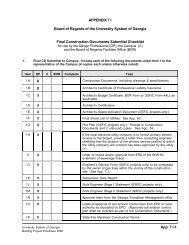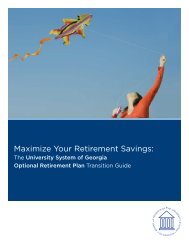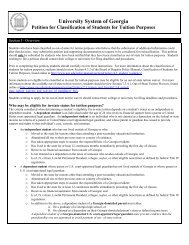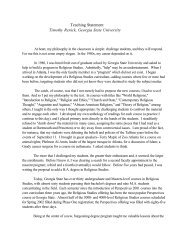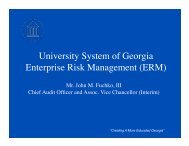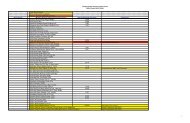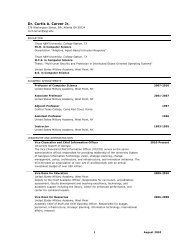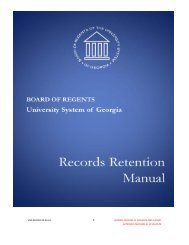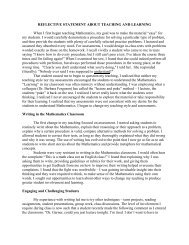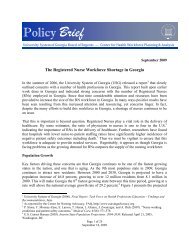WReier-Aviles on DSKGBLS3C1PROD with RULES266892 Federal Register / Vol. 75, No. 209 / Friday, October 29, 2010 / Rules and Regulationsschool diploma when they did notcomplete the required coursework toreceive an actual diploma from theschool and that these students mayincorrectly believe that the certificate oraward is a diploma.Discussion: Students who do notcomplete the required coursework toreceive a high school diploma from theirsecondary school by definition did notearn a high school diploma. Thesestudents are not eligible for title IV,HEA aid unless they meet the academicrequirement under one <strong>of</strong> thealternatives to a high school diploma in§ 668.32(e), or they are students withintellectual disabilities who are seekingPell, FSEOG, or FWS program assistanceunder § 668.233.Changes: None.Comment: One commenter asked usto clarify what would cause aninstitution to have ‘‘reason to believethat the high school diploma is not validor was not obtained from an entity thatprovides secondary school education.’’Discussion: We expect that there maybe a number <strong>of</strong> situations in which aninstitution will have reason to believethat an applicant’s high school diplomais not valid or was not obtained from anentity that provides secondary schooleducation. For example, institutionsmay come across information thatsuggests that the applicant’s diploma ortranscript was purchased with littlework expected <strong>of</strong> the student. OftenFAAs receive conflicting informationfrom students themselves, typically asremarks that cast doubt on someelement <strong>of</strong> the students’ applicationinformation. We expect the sameregarding valid high school diplomas.Moreover, institutions may have reasonto believe that a high school diploma isinvalid if they recognize the name <strong>of</strong> thehigh school as an entity that theyidentified in the past as being a highschool diploma mill.Changes: None.Comment: One commenter requestedthat we add a check box on the FAFSAfor applicants who completed secondaryschool in a foreign country and anempty space for them to fill in the name<strong>of</strong> their secondary school. Thecommenter suggested that in thissituation, the student’s FAFSA wouldreceive a ‘‘C’’ code, not automatically,but at random, so that due diligencewould still be required by theinstitution.Discussion: When completing theFAFSA, applicants will be able to enterthe name <strong>of</strong> their high school if it is noton the <strong>Department</strong>’s drop-down list.Changes: None.Comment: One commenter expressedconcern that the wording <strong>of</strong> the secondnew question proposed for the FAFSA,as noted in the preamble to the NPRM,could be misleading and suggested thatthe <strong>Department</strong> use either <strong>of</strong> thefollowing questions instead:• In what State is the school listed inquestion #1 located? or• In what State was the school inwhich the student completed highschool located?Discussion: As we noted earlier in thispreamble, the 2011–2012 FAFSA asksfor applicants to indicate the name <strong>of</strong>the high school where they received orwill receive their diploma and the cityand State where the school is located.Changes: None.Return <strong>of</strong> Title IV, HEA Program Funds(§§ 668.22(a), 668.22(b), 668.22(f), and668.22(l))Treatment <strong>of</strong> Title IV, HEA ProgramFunds When a Student Withdraws FromTerm-Based Programs With Modules orCompressed Courses (§§ 668.22(a),668.22 (f) and 668.22 (l))Comment: Approximately 80commenters, mostly representinginstitutions, commented on theproposed changes to the treatment <strong>of</strong>title IV, HEA program funds when astudent withdraws from a program<strong>of</strong>fered in modules. Approximately 26<strong>of</strong> these commenters opposed theproposed changes, with somecommenters recommending that the<strong>Department</strong> not issue final regulations atthis time and instead seek further inputfrom the community.Many <strong>of</strong> these commenters believedthe proposed changes would be tooburdensome to institutions. Severalcommenters were concerned about theadditional administrative and financialburden the proposed changes wouldimpose on institutions by requiringthem to identify and process morestudents as withdrawals. A fewcommenters believed that, as a result <strong>of</strong>this burden, the proposed regulationswould discourage schools from <strong>of</strong>feringprograms in modules, potentiallycausing disruptive changes in course<strong>of</strong>ferings at institutions. A fewcommenters believed institutions wouldbe unable to comply with the proposedregulations because they are toocomplicated or too difficult to explain tostudents. One commenter believed theproposed regulations would force aninstitution to delay disbursements toprevent the institution or student fromhaving to return unearned title IV, HEAprogram funds if the student withdrew.Many <strong>of</strong> these commenters alsobelieved that the proposed changeswould be harmful to students becausesome students who withdrew afterVerDate Mar2010 14:10 Oct 28, 2010 Jkt 223001 PO 00000 Frm 00062 Fmt 4701 Sfmt 4700 E:\FR\FM\29OCR2.SGM 29OCR2completing one course in one modulewould earn less title IV, HEA programfunds. In particular, some commentersbelieved it was unfair to treat as awithdrawal a student who withdrewfrom a course or courses in the paymentperiod or period <strong>of</strong> enrollment, but whowould attend courses later in the samepayment period or period <strong>of</strong> enrollment,and wanted to know how to handle titleIV, HEA program funds in such cases.A few commenters believed theproposed regulations would discouragestudents from enrolling in programsstructured in modules, includingcompressed courses to acceleratecompletion <strong>of</strong> their program, which thecommenters believed was in conflictwith the provisions for two Federal PellGrants in one award year, which wereimplemented to support and makeequitable aid available for students whowish to complete their program sooner.A few commenters were concerned thata student who would now be counted asa withdrawal would be burdened withmore debt: To the institution for anyremaining balance <strong>of</strong> tuition and fees,and to the <strong>Department</strong> for Federal loansand or grant overpayments. Onecommenter noted that treating a studentas a withdrawal also has negativeconsequences for a student under theprovisions on satisfactory academicprogress and loan repayment.A few commenters believed theproposed regulations unfairly targetedcertain programs or institutions. Some<strong>of</strong> the commenters believed theproposed changes would treat studentsin module programs inequitably whencompared to students in moretraditional programs where courses are<strong>of</strong>fered concurrently. One commenterbelieved that the proposed regulationswould have a disproportionatelynegative affect for students in careertechnical programs, as many <strong>of</strong> thoseprograms are taught in a condensed,modular form. Some commentersbelieved the proposed regulationsunfairly focused on only term-basedcredit-hour programs.Approximately 25 <strong>of</strong> the commentersexpressed an understanding <strong>of</strong> the<strong>Department</strong>’s concern with studentsreceiving full or large amounts <strong>of</strong> titleIV, HEA program funds for a shortperiod <strong>of</strong> attendance during a paymentperiod or period <strong>of</strong> enrollment. Acouple <strong>of</strong> those commenters agreed withthe proposed changes. Others believedthat the current guidance from DearColleague Letter <strong>of</strong> December 2000,GEN–00–24, Return <strong>of</strong> Title IV Aid-Volume #1—which provided that astudent who completed only onemodule or compressed course within aterm was not considered to have
Federal Register / Vol. 75, No. 209 / Friday, October 29, 2010 / Rules and Regulations66893WReier-Aviles on DSKGBLS3C1PROD with RULES2withdrawn—should be incorporatedinto the regulations. These commentersbelieved that a student who has earnedcredits in a payment period or period <strong>of</strong>enrollment who then ceases attendanceshould not be treated as a withdrawal,as the existing regulations in 34 CFR690.80(b)(2)(ii), requiring recalculations<strong>of</strong> title IV, HEA program funds when astudent did not begin attendance in allclasses, are a sufficient safeguard againststudents receiving full or large amounts<strong>of</strong> title IV, HEA program funds for ashort period <strong>of</strong> attendance in a program<strong>of</strong>fered in modules. Two commentersbelieved that the satisfactory academicprogram provisions should be sufficientto prevent long-term abuse by students<strong>of</strong> title IV, HEA program funds.Several commenters suggestedalternative approaches to ensure thatstudents are not receiving title IV, HEAprogram funds for periods in which theyare not in attendance. A fewcommenters believed that a studentattending a certain percentage <strong>of</strong> thepayment period or period <strong>of</strong> enrollment(commenters suggested 60 percent)should be deemed to have completed apayment period or period <strong>of</strong> enrollment.A couple <strong>of</strong> commenters believed thatthe determination <strong>of</strong> whether a studentshould be treated as a withdrawalshould be based on credit hourscompleted, rather than days completed,meaning that a student who ceasedattendance would not be treated as awithdrawal as long as the studentcompleted the minimum number <strong>of</strong>credits required to be eligible for aparticular title IV, HEA program. A fewcommenters supported setting aminimum length <strong>of</strong> a module that mustbe completed, after which a studentwho ceased attendance would not beconsidered to have withdrawn. A fewcommenters suggested requiringinstitutions to award or pay title IV,HEA program funds by module, or todelay payment until a student hasearned enough credits to support theenrollment status necessary foreligibility <strong>of</strong> the aid. One commentersuggested limiting the amount <strong>of</strong> titleIV, HEA program funds that can beearned by a student to the lesser <strong>of</strong>actual charges or the amount calculatedunder the Return <strong>of</strong> Title IV Fundsprovisions (i.e., the provisions <strong>of</strong>§ 668.22). A couple <strong>of</strong> commentersbelieved an institution should be able toexercise pr<strong>of</strong>essional judgment or use itsown discretion to determine whether astudent has truly withdrawn from class.One commenter suggested that, forclock-hour and nonterm programs, astudent be considered to havewithdrawn if the student had not beenin attendance for 35 consecutive daysand had not completed the paymentperiod or period <strong>of</strong> enrollment.One commenter believed that theproposed changes addressingcompletion <strong>of</strong> a payment period orperiod <strong>of</strong> enrollment by students inclock-hour programs were incorrect asall determinations <strong>of</strong> title IV, HEAprogram funds earned by students whowithdraw from clock-hour programs aidare based on scheduled hours, and thechanges referred to clock hourscompleted.Discussion: We note that these finalregulations do not change howinstitutions are currently required totreat students when they withdraw fromprograms <strong>of</strong>fered in modules (i.e.,sequentially) in nonterm credit-hourprograms, and some nonstandard-termcredit-hour programs. The Secretarybelieves that the approach proposed inthe NPRM treats students moreequitably across all programs byeliminating the major differences in thetreatment <strong>of</strong> students who withdrawfrom term-based and nonterm-basedprograms <strong>of</strong>fered in modules and,therefore, is a better approach thanbasing the determination <strong>of</strong> completion<strong>of</strong> a payment period or period <strong>of</strong>enrollment on completion <strong>of</strong> onecourse/module, even if a minimumlength <strong>of</strong> such a course/module wereset. In addition, this approach moreaccurately reflects the statutoryrequirement in section 484B(a)(1) <strong>of</strong> theHEA that applies the Return <strong>of</strong> Title IVFunds requirements to any recipient <strong>of</strong>title IV, HEA program funds who‘‘withdraws from an institution during apayment period or period <strong>of</strong> enrollmentin which the student began attendance’’and the fact that title IV, HEA programfunds are awarded for an entire paymentperiod or period <strong>of</strong> enrollment. Some <strong>of</strong>the alternatives suggested by thecommenters—determining completionbased on attendance <strong>of</strong> a certainpercentage <strong>of</strong> the payment period orperiod <strong>of</strong> enrollment; using credit hourscompleted, instead <strong>of</strong> days completed;delaying awarding or paying title IV,HEA program funds; equating unearnedaid to actual charges; and leaving thedetermination <strong>of</strong> completion <strong>of</strong> theperiod up to institutional discretion—are not supported by the HEA, whichrequires in section 484B(a) that studentsearn title IV, HEA program funds on apro rata basis up through the 60 percentpoint <strong>of</strong> a period based on dayscompleted, for credit-hour programs,and clock hours completed, for clockhourprograms. Completing more than60 percent <strong>of</strong> the period then entitles astudent to have earned 100 percent <strong>of</strong>the funds for the period. The lawVerDate Mar2010 14:10 Oct 28, 2010 Jkt 223001 PO 00000 Frm 00063 Fmt 4701 Sfmt 4700 E:\FR\FM\29OCR2.SGM 29OCR2therefore does not permit the alternativemeasures <strong>of</strong> when a student may keep100 percent <strong>of</strong> the title IV, HEA programfunds that were suggested by thecommenters.The Secretary agrees that it isreasonable to allow an institution not totreat as a withdrawal a student whoceases attendance during a paymentperiod or period <strong>of</strong> enrollment, butintends to attend a course later in thepayment period or period <strong>of</strong> enrollment.This position is consistent with theguidance provided in the <strong>Department</strong>’sDear Colleague Letter <strong>of</strong> December 2000,GEN–00–24, Return <strong>of</strong> Title IV Aid-Volume #1, for the treatment <strong>of</strong> title IV,HEA program funds when a studentwithdraws without completing at leastone course in a payment period orperiod <strong>of</strong> enrollment. These finalregulations have been modified toincorporate this policy and provide thata student is not considered to havewithdrawn if the student ceasedattending the modules he or she wasscheduled to attend, but the institutionobtains a written confirmation from thestudent at the time <strong>of</strong> the withdrawalthat he or she will attend a module thatbegins later in the same payment periodor period <strong>of</strong> enrollment. This willprovide more flexibility for a studentwho provides the authorization. Thisconfirmation must be obtained at thetime <strong>of</strong> withdrawal, even if the studenthas already registered for subsequentcourses. However, these finalregulations provide that, for nontermand nonstandard-term programs, aconfirmation is valid only if the modulethe student plans to attend begins nolater than 45 calendar days after the end<strong>of</strong> the module the student ceasedattending. If the institution has notobtained a written confirmation that thestudent intends to return to a nontermor nonstandard-term program within 45calendar days <strong>of</strong> the end <strong>of</strong> the modulethe student ceased attending, thestudent is considered to havewithdrawn. A student who has providedwritten confirmation <strong>of</strong> his or her intentto return is permitted to change the date<strong>of</strong> return to a module that begins evenlater in the same payment period orperiod <strong>of</strong> enrollment, provided that thestudent does so in writing prior to thereturn date that he or she hadpreviously confirmed, and, for nontermand nonstandard-term programs, thelater module that he or she will attendbegins no later than 45 calendar daysafter the end <strong>of</strong> the module the studentceased attending. If an institutionobtains a written confirmation <strong>of</strong> futureattendance but the student does notreturn as scheduled, the student is
- Page 1 and 2:
Friday,October 29, 2010Part IIDepar
- Page 3 and 4:
Federal Register / Vol. 75, No. 209
- Page 6 and 7:
66836 Federal Register / Vol. 75, N
- Page 8 and 9:
66838 Federal Register / Vol. 75, N
- Page 10 and 11:
WReier-Aviles on DSKGBLS3C1PROD wit
- Page 12 and 13: 66842 Federal Register / Vol. 75, N
- Page 14 and 15: 66844 Federal Register / Vol. 75, N
- Page 16 and 17: WReier-Aviles on DSKGBLS3C1PROD wit
- Page 18 and 19: 66848 Federal Register / Vol. 75, N
- Page 20 and 21: 66850 Federal Register / Vol. 75, N
- Page 22 and 23: WReier-Aviles on DSKGBLS3C1PROD wit
- Page 24 and 25: 66854 Federal Register / Vol. 75, N
- Page 26 and 27: WReier-Aviles on DSKGBLS3C1PROD wit
- Page 28 and 29: 66858 Federal Register / Vol. 75, N
- Page 30 and 31: 66860 Federal Register / Vol. 75, N
- Page 32 and 33: 66862 Federal Register / Vol. 75, N
- Page 34 and 35: 66864 Federal Register / Vol. 75, N
- Page 36 and 37: 66866 Federal Register / Vol. 75, N
- Page 38 and 39: WReier-Aviles on DSKGBLS3C1PROD wit
- Page 40 and 41: WReier-Aviles on DSKGBLS3C1PROD wit
- Page 42 and 43: 66872 Federal Register / Vol. 75, N
- Page 44 and 45: WReier-Aviles on DSKGBLS3C1PROD wit
- Page 46 and 47: WReier-Aviles on DSKGBLS3C1PROD wit
- Page 48 and 49: WReier-Aviles on DSKGBLS3C1PROD wit
- Page 50 and 51: 66880 Federal Register / Vol. 75, N
- Page 52 and 53: WReier-Aviles on DSKGBLS3C1PROD wit
- Page 54 and 55: 66884 Federal Register / Vol. 75, N
- Page 56 and 57: 66886 Federal Register / Vol. 75, N
- Page 58 and 59: WReier-Aviles on DSKGBLS3C1PROD wit
- Page 60 and 61: WReier-Aviles on DSKGBLS3C1PROD wit
- Page 64 and 65: WReier-Aviles on DSKGBLS3C1PROD wit
- Page 66 and 67: WReier-Aviles on DSKGBLS3C1PROD wit
- Page 68 and 69: WReier-Aviles on DSKGBLS3C1PROD wit
- Page 70 and 71: WReier-Aviles on DSKGBLS3C1PROD wit
- Page 72 and 73: 66902 Federal Register / Vol. 75, N
- Page 74 and 75: WReier-Aviles on DSKGBLS3C1PROD wit
- Page 76 and 77: WReier-Aviles on DSKGBLS3C1PROD wit
- Page 78 and 79: 66908 Federal Register / Vol. 75, N
- Page 80 and 81: WReier-Aviles on DSKGBLS3C1PROD wit
- Page 82 and 83: 66912 Federal Register / Vol. 75, N
- Page 84 and 85: WReier-Aviles on DSKGBLS3C1PROD wit
- Page 86 and 87: 66916 Federal Register / Vol. 75, N
- Page 88 and 89: WReier-Aviles on DSKGBLS3C1PROD wit
- Page 90 and 91: WReier-Aviles on DSKGBLS3C1PROD wit
- Page 92 and 93: WReier-Aviles on DSKGBLS3C1PROD wit
- Page 94 and 95: 66924 Federal Register / Vol. 75, N
- Page 96 and 97: WReier-Aviles on DSKGBLS3C1PROD wit
- Page 98 and 99: 66928 Federal Register / Vol. 75, N
- Page 100 and 101: WReier-Aviles on DSKGBLS3C1PROD wit
- Page 102 and 103: 66932 Federal Register / Vol. 75, N
- Page 104 and 105: WReier-Aviles on DSKGBLS3C1PROD wit
- Page 106 and 107: 66936 Federal Register / Vol. 75, N
- Page 108 and 109: 66938 Federal Register / Vol. 75, N
- Page 110 and 111: 66940 Federal Register / Vol. 75, N
- Page 112 and 113:
66942 Federal Register / Vol. 75, N
- Page 114 and 115:
66944 Federal Register / Vol. 75, N
- Page 116 and 117:
66946 Federal Register / Vol. 75, N
- Page 118 and 119:
WReier-Aviles on DSKGBLS3C1PROD wit
- Page 120 and 121:
WReier-Aviles on DSKGBLS3C1PROD wit
- Page 122 and 123:
WReier-Aviles on DSKGBLS3C1PROD wit
- Page 124 and 125:
66954 Federal Register / Vol. 75, N
- Page 126 and 127:
WReier-Aviles on DSKGBLS3C1PROD wit
- Page 128 and 129:
66958 Federal Register / Vol. 75, N
- Page 130 and 131:
66960 Federal Register / Vol. 75, N
- Page 132 and 133:
WReier-Aviles on DSKGBLS3C1PROD wit
- Page 134 and 135:
WReier-Aviles on DSKGBLS3C1PROD wit
- Page 136 and 137:
WReier-Aviles on DSKGBLS3C1PROD wit
- Page 138 and 139:
66968 Federal Register / Vol. 75, N
- Page 140 and 141:
66970 Federal Register / Vol. 75, N
- Page 142 and 143:
66972 Federal Register / Vol. 75, N
- Page 144 and 145:
66974 Federal Register / Vol. 75, N



